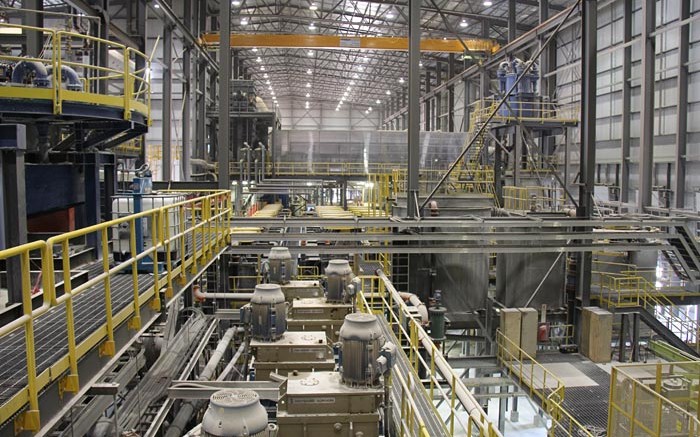Shares in RB Energy (TSX: RBI; US-OTC: RBEIF) tumbled by 28% on news that technical issues would delay production at its Quebec Lithium project, and that the company needs another cash infusion just two months after closing a $22-million bought-deal financing.
The project, located 60 km north of Val-d’Or, Que., is expected to reach full production of 20,000 tonnes per year in the first quarter of 2015, and commercial production (half-capacity) in the fourth quarter of 2014 — a delay of several months. RB Energy had expected commercial production in the third quarter of this year, followed by full production before year-end.
The Quebec Lithium plant consists of a “front end” that produces spodumene concentrate from mined ore and a “back end” that produces battery-grade lithium carbonate from the spodumene concentrate.
The plant had been briefly shut down in July for scheduled maintenance and upgrades. While those are now complete, RB Energy is having problems with its kiln, which converts alpha spodumene to beta spodumene, the first step of the process to convert spodumene concentrate to lithium carbonate.
“We are at a critical time in our commissioning efforts at the Quebec Lithium operation,” Rick Clark, RB Energy’s president and CEO, said in a release.
“The important step of maintaining continuous production will be achieved after overcoming our unexpected operational challenges. Our toes are on the finish line and we are committed to completing the commissioning process as quickly and efficiently as possible.”
Luisa Moreno, a mining analyst at Euro Pacific Capital, says the setback is disappointing, especially since the company is so close to production.
“The company raised $22 million not long ago, and it was for a number of improvements, like the ore sorter, a new road, gas plant — all these improvements that they identified in order to lower costs — and not long after that they come out and say they have, effectively, a new problem,” Moreno says.
RB Energy is also having purification issues, and has not produced battery-grade lithium carbonate (99.99% purity). Instead, it is selling technical-grade material (99.95% purity) until it works out its purification process.
In a note to clients, Dundee Capital Markets analyst David Talbot explained that the price differential between technical-grade and battery-grade lithium carbonate is 15% ($4,700 per tonne instead of $5,500 per tonne).
While RB Energy’s cash balance and lack of visible cash flow is a concern, Talbot says the mine will work.
“Our confidence is rattled, and we didn’t expect such a production lag, but we like the stop-gap idea of selling technical-grade for now, and believe operations have been as advanced as they ever have been,” the analyst said, who expects strong growth in the lithium sector for the next several years.
“Chalk the delays up to the fact that this type of plant hasn’t been built in North America for over forty years, and there really is no expertise.”
Talbot lowered his price target for RB Energy to 80¢ from $1.70 and his rating to “neutral” from “buy.”
RB Energy had expected to produce up to 9,000 tonnes of battery-grade lithium carbonate this year. Talbot now estimates only 3,000 tonnes of technical-grade material will be produced.
RB Energy did not say how much money it needs, but Talbot estimates the company is looking for at least another $20 million.
Moreno notes that with the plant complete, RB will only look for enough working capital to carry it through until the kiln issues are resolved. Tinkering with the kiln, however, is time-consuming, as it requires time to shut down and cool off in order to make modifications, and more time to restart and reach high-enough temperatures to work.
In terms of funding options, Moreno points out that RB Energy could sell its inventory of 800 tonnes of iodine from its Aguas Blancas mine in northern Chile if the markets are not receptive to another financing. If the company gets top dollar for the inventory, it could get as much as $30.4 million (or $25 million, subtracting production costs). However, if it has to sell at a hefty discount — as could well be the case if it finds a buyer to take it all — it could receive a lot less. The company could also sell only part of its inventory.
It’s possible that the company’s offtake partners — Tewoo and Marubeni — could be persuaded to make advance payments for future production. Between them, the two companies have secured 75% of RB Energy’s production. (Chinese commodity trader Tewoo already made a $5-million prepayment last September.)
On the positive side, most of the bigger issues at Quebec Lithium have been sorted out. During the recent shutdown, the company relined the rod mill, modified the kiln and the grizzly in the crushing circuit, and completed the tie-in of a primary optical ore sorter. The ore sorter is expected to reduce dilution and increase the concentrate grade entering the kiln, thereby improving the conversion process of alpha spodumene to beta spodumene.
The company will divert a minor road to the site shortly, and a natural gas pipeline is slated to be completed before year-end.
RB Energy is the product of a merger between Canada Lithium and Sirocco that was finalized in January.
Quebec Lithium is a past-producing hard-rock mine, with lithium occurring in pegmatite dykes reaching up to 15 metres. The project has a 12-year mine life and proven and probable reserves of 17.1 million tonnes grading 0.94% Li2O.
RB Energy shares ended the day down 14.5¢, or 28.4%, at 36.5¢ on 9.8 million shares traded.
The company has 263.3 million shares outstanding.


Be the first to comment on "RB Energy shares tank on production delay, financing needs"